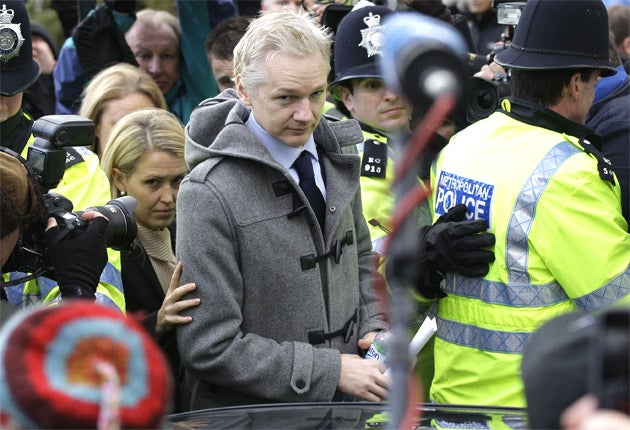'If my client ends up in the US he'll go to Guantanamo, or be executed,' says Assange's lawyer
Claim that grisly fate awaits the WikiLeaks founder if he is extradited

Julian Assange fears that he will be sent to Guantanamo Bay and ultimately executed if he is extradited to Sweden to face allegations of sexual assault, his legal team said yesterday.
Lawyers working on behalf on the WikiLeaks founder are fighting his extradition from the UK. Yesterday they published an outline of the arguments they will use in an attempt to stop British authorities removing Mr Assange to Sweden.
Among their objections is that there is a "real risk" that the Swedes will hand Mr Assange over to the United States, where he has provoked immense anger with his the leaking of 250,000 diplomatic cables.
The 35-page document states: "It is submitted that there is a real risk that, if extradited to Sweden, the US will seek his extradition and/or illegal rendition to the USA, where there will be a real risk of him being detained at Guantanamo Bay." It continues: "Indeed, if Mr Assange were rendered to the USA, without assurances that the death penalty would not be carried out, there is a real risk that he could be made subject to the death penalty. It is well known that prominent figures have implied, if not stated outright, that Mr Assange should be executed."
The document goes on to quote the Republican presidential hopeful Mike Huckabee who has previously said of Mr Assange: "I think anything less than execution is too kind a penalty." It also quotes Sarah Palin, who said that he should be "pursued with the same urgency we pursue al-Qaeda and Taliban leaders".
Mr Assange's legal team released their skeleton argument after a short case management hearing at Woolwich crown court in south London yesterday. It highlighted points which they will argue at the full extradition hearing next month.
The document also suggests that the European Arrest Warrant issued by the Swedes is not valid. Mr Assange's lawyers say that the prosecutor, Marianne Ny, is not able to authorise such a warrant and that the Swedish National Police Board is the proper authority for doing so.
The document also claims that the extradition has been sought for an "improper purpose" – namely that such a sanction should not be used merely to make Mr Assange available for questioning. The legal team will also argue that the details of the alleged sexual offences that Mr Assange is wanted for in Sweden would not constitute offences in the UK. Mr Assange denies all of the offences.
The full extradition hearing will take place at Woolwich over two days, beginning on 7 February. Yesterday's hearing was notable for the continuation of the global media circus which accompanies every court appearance Mr Assange makes. There were large queues outside the court and police officers had to contain a pack of more than 100 journalists when Mr Assange made a short speech after the hearing stating that he was happy with the outcome and that his work with WikiLeaks would continue.
The placard-waving supporters of the WikiLeaks founder had, however, declined in number from the many who attended his previous appearances in central London. Yesterday there were no more than 10.
There were slight alterations to Mr Assange's bail conditions. District Judge Nicholas Evans agreed to allow him to sleep at the Frontline Club – a club for journalists in central London – on the two nights before the hearing next month. Mr Assange is staying at the Norfolk home of Vaughan Smith, the club's owner. His supporters include the human rights campaigner Bianca Jagger, socialite Jemima Khan and Gavin MacFadyen, director of the Centre for Investigative Journalism. All three attended the hearing.
